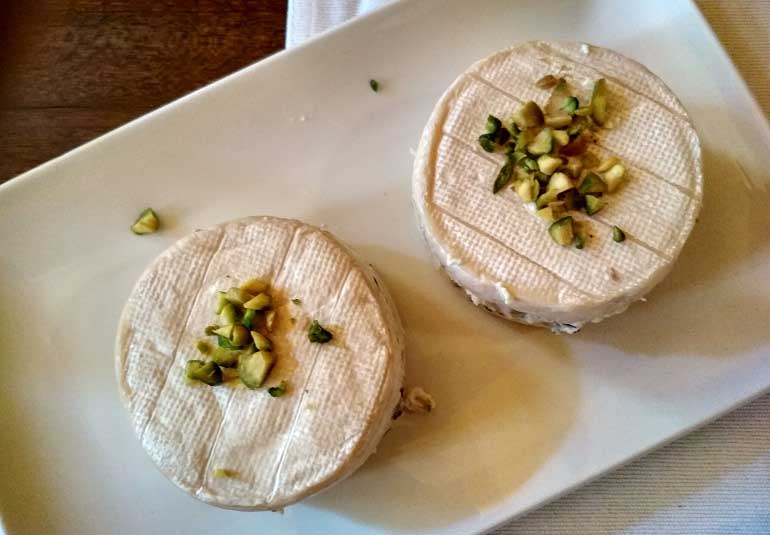Four French Cheeses You Must Try (with Easy Recipes)
- By Ankita ShreeramLoading...
- | 14 Dec 2017 11:50 AM IST
 X
X
The French may not have paneer but they have a whole battery of exotic fresh and aged cheeses with sour, sweet, salty and even bitter flavours at times. With textures ranging from soft to hard, these cheeses are great on their own, with a glass of wine to cleanse the palate between different varieties.
 Cheesemonger Francois Robin adds pomegranate molasses to the comte on crispy hot paratha
Cheesemonger Francois Robin adds pomegranate molasses to the comte on crispy hot paratha
I'm no stranger to the fancy nuances of wine tasting but earlier this week, renowned French cheesemonger Francois Robin introduced me to the process of cheese tasting. With our eyes blindfolded and our noses clipped, we took little bites of four mystery cheeses and attempted to analyse their textures.
You can't imagine how relieved I was when I could finally take the nose clip off and actually taste the cheeses. It was a good reminder that the sense of smell is so vital for the taste buds to function. And so if you have an urge to smell your pasta before eating it, worry not about propriety and sniff away to glory.
 Indian cheesemonger Mansi tells us about pairing European cheeses with Indian dishes
Indian cheesemonger Mansi tells us about pairing European cheeses with Indian dishes
But the biggest revelation of that morning was that European cheeses could be paired with Indian dishes as well. Here are four cheeses you should try immediately (they are tasty as well as nutritious), along with easy serving suggestions (we bet your kids will love them too!):
1. Comté
The most popular French cheese, you're likely to find a wheel of comté in every household in France. It's a bit like emmental and can be stored for a long time. The one we tried had been aged for nine to ten months and had a sweet aftertaste. The firm cow's milk cheese has waves on top and a neutral taste that everyone will love.
Recipe: Comté on crispy paratha

Make a hot paratha and cook it a bit longer to make it crispier than usual. Place a slab of comté on top and drizzle with pomegranate molasses (or honey if you don't have that). Eat at once.
2. Brie
Most of us would have heard of this low-fat cheese, known for its thin rind containing edible bacteria. The soft, rich and creamy cheese lends itself to many recipes and is named after the town where it first originated. Remember to refrigerate immediately after purchase.
Recipe: Stuffed brie sandwich

Slice a wheel of brie into two. Make a mixture of creamy mascarpone, roasted pistachios, pomegranate seeds and gin and stuff it between the brie slices. Cut into wedges and serve.
Recipe: Brie bruschetta

Slice a whole-wheat baguette or similar hard bread. Place a wedge of brie on each piece and top with Gujarati chunda or sweet mango pickle (even jam or marmalade might do the trick).
3. Chèvre
My personal favourite, this is French goat's cheese that's super soft, crumbly and salty. It literally melts in the mouth and is bright white in colour. The fact that it has no rind indicates that it's fresh and not aged.
Recipe: Mini dosas with chèvre

Put the chèvre in a piping bag and chop coriander. Make small dosas and top with the chèvre from the piping bag in a circular motion. Season with the chopped coriander and Himalayan honey (or any other). Drizzle sesame seeds on top for extra crunch and an attractive appearance.
4. Fourme d'Ambert
 From left: Goat's cheese and blue cheese
From left: Goat's cheese and blue cheese
There are many types of blue cheese, all of which contain activated mushroom inside them. We tried the fourme d'ambert, a hard version of blue cheese with a wonderful smoky flavour. Its complexity is best enjoyed on its own.
Tip: For the kids, use a glass of carrot or watermelon juice as a delicious palate cleanser. These cheeses can be sourced from gourmet stores like Nature's Basket. Use any variety of blue cheese and goat's cheese instead of the ones mentioned here. Brie is easily available and emmental can be swapped for comté.



